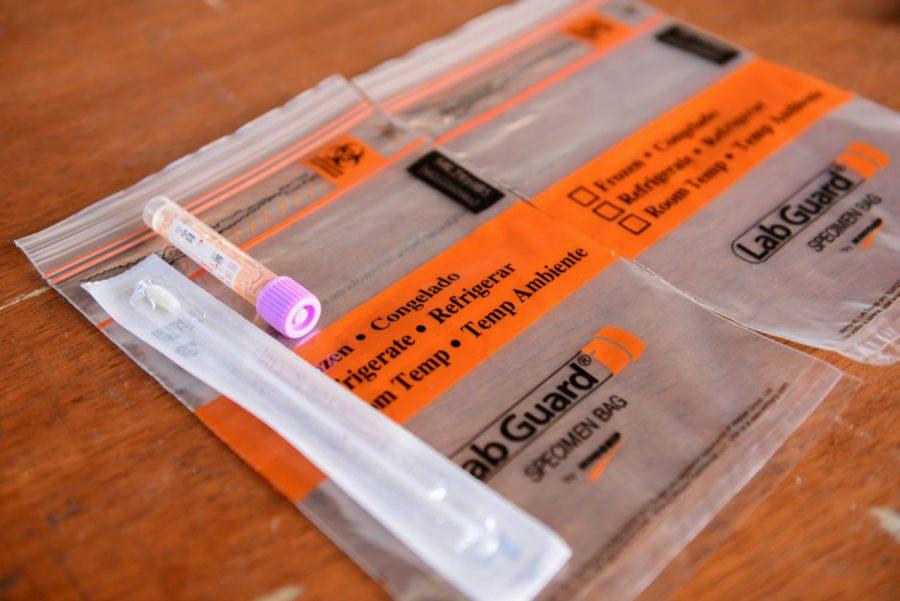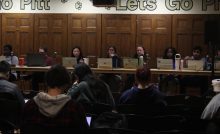Pitt adds 7 COVID-19 cases since Tuesday


Pitt added seven new COVID-19 cases, composed of seven students and no employees, between Tuesday and Thursday, with 13 students currently in isolation. The University’s previous case report, covering last Friday to Monday, included seven cases.
This is the ninth case report since Pitt moved back to the middle Elevated Risk posture and enacted a shelter-in-place. These stricter measures followed a “consistent increase” in positive cases among students and the detection of the variant first found in the U.K., B.1.1.7, on campus. The shelter-in-place order will remain in effect until the COVID-19 Medical Response Office announces that it has been lifted, and said it’s “essential” for in-person commencement ceremonies which began this week.
Data collected by The Pitt News. Original data collection by Ryan Yang, Online Visual Editor. Archival data by Spotlight PA and the Philadelphia Inquirer. Graph by Jon Moss, Editor-in-Chief.The CMRO said in a Friday evening email that while case counts “continue to decrease,” Allegheny County is still reporting “elevated case numbers, indicating high level of virus circulation in the area” and student testing is “low.” This is the CMRO’s final update for the academic year.
“Students should continue sheltering in place to keep your family and friends at home as safe as possible,” the email said. “Maintain good hand hygiene and at least 6 feet of distance between yourself and others at all times.”
The Allegheny County Health Department and state health officials have continued to report high case numbers. According to hospital data compiled by The New York Times, about 87% of ICU beds in the Pittsburgh area are currently occupied, compared with 82% statewide and 71% nationally. UPMC Shadyside is at 95% capacity and has nine ICU beds remaining.
The University has had 1,397 students and 245 employees test positive since June 26, with 1,384 students and 242 employees recovered thus far.
The CMRO also encouraged students to get vaccinated ahead of what will hopefully be “as normal a fall term as possible.” Pitt opened a new vaccine clinic in Nordenberg Hall that will be able to provide about 100 people vaccines per week on a walk-in basis throughout the summer.
There are 13 students currently isolated at home or in Pitt’s isolation housing, which is reserved for those who have either a confirmed or suspected COVID-19 infection. Pitt has about 300 isolation beds.
The University is planning for on-campus, in-person instruction for the majority of classes as well as “the full range” of on-campus living and activities for the fall semester. Chancellor Patrick Gallagher said these plans depend on continued availability of the vaccine across the country, and that Pitt doesn’t anticipate a requirement that the incoming class have the COVID-19 vaccine.
Pitt implemented a systematic, random testing strategy, which involves testing several hundred students each week on Mondays and Wednesdays inside Posvar Hall. Pitt has since discontinued this surveillance testing and replaced it with walk-in, no-questions-asked testing at the same location.
The University also implemented a variety of new policies due to the pandemic during the spring semester, though some community members questioned whether the safeguards are sufficient. Students moved into dorms in four cohorts, beginning in late January and continuing into early February. Students needed a negative COVID-19 test before moving back on campus. Faculty and staff also have access to mail-in tests if they meet certain criteria.
Additionally, students are encouraged to shelter in place at least seven days before moving in. Once on campus, students are required to shelter in place again for at least 10 days or until the CMRO announces that it’s safe to move about campus. Students may attend classes during this time. Pitt also planned testing of students to monitor the virus’ spread, required students, faculty and staff to complete COVID-19 training and imposed strict penalties for violations of health guidelines.
Kenyon Bonner, the vice provost and dean of students, said student organizations who host a party or event can face suspension, and students hosting large parties can be suspended. Students living on campus who attend large parties can have their housing suspended for the semester, and students living off campus can be switched to persona non grata status, preventing them from entering University buildings or property.
Recent Posts
SGB addresses concerns about ICE presence on campus, hears SJP lawsuit against administration, approves governing code bill
At its weekly meeting on Tuesday at Nordy’s Place, Student Government Board heard concerns about…
ACLU of Pennsylvania sues Pitt over SJP suspension
The ACLU of Pennsylvania filed a federal civil lawsuit against the University of Pittsburgh and…
Marquan Pope: The ultimate shark
One of the most remarkable things about sharks is that an injury doesn’t deter them.…
Who Asked? // Do we really get a summer vacation?
This installment of Who Asked? by staff writer Brynn Murawski mourns the seemingly impossible perfect…
Notes From an Average Girl // Notes from my junior year
In this edition of Notes From an Average Girl, senior staff writer Madeline Milchman reflects…
Meaning at the Movies // The Power of the Movie Theater
In this edition of “Meaning at the Movies,” staff writer Lauren Deaton discusses her love…

